Choosing between FamilyTreeDNA and AncestryDNA for your genetic exploration can present a bit of a conundrum. Each platform boasts distinctive strengths that cater to various interests within the realm of DNA testing and genealogy.
FamilyTreeDNA is lauded for its in-depth lineage tests, including Y-DNA and mtDNA tests, which are not offered by many competitors. This makes it particularly valuable for those looking to trace their direct paternal or maternal ancestral lines far back in time. Its focus on deep ancestral roots appeals to genealogy enthusiasts dedicated to a comprehensive understanding of their family’s origins.
On the flip side, AncestryDNA is celebrated for its vast user database, the largest among DNA testing services, enhancing the likelihood of discovering and connecting with distant relatives. Additionally, its ethnicity estimation is among the most detailed, providing insights into a wide array of regions and cultures. This, combined with its robust genealogical resources, makes AncestryDNA a top pick for individuals aiming to construct a detailed family tree and uncover the broader story of their heritage.
While both FamilyTreeDNA and AncestryDNA offer valuable insights into your ancestry, the choice between them may come down to whether your interest lies more in detailed direct lineage testing or in exploring a broader family history and making connections with a wide network of relatives.
FamilyTreeDNA and Ancestry DNA Deals Update 2024
Quick Comparison: FamilyTreeDNA vs. AncestryDNA
| Feature | AncestryDNA | FamilyTreeDNA |
|---|---|---|
| ⚙ Types of DNA Tests | Ancestry DNA tests; Traits DNA test | Ancestry DNA test; Wellness DNA test |
| 🤑 Pricing | Starts at $99 | Starts at $79 |
| 💉 Sample Collection | Cheek swab | Cheek swab |
| ⌛ Turnaround Time | Within 8 weeks | 4 to 5 weeks |
| 📚 Database Size | 19 billion DNA samples; 20 billion + historical records | 6 million DNA samples; 2 million records |
| 🌍 Geographical Coverage | 1,800+ geographical regions | 90 reference populations |
| ❓ Allows free raw DNA upload? | No | Yes |
| 💰 Free trial | Yes (14 days) | No |
| 📜 Subscription service | Yes (three tiers, starts at $24.99) | No |
| ⭐ Review (Updated 2023) | AncestryDNA Full Review | FamilyTreeDNA Full Review |
Types of DNA Kits Offered by FamilyTreeDNA and AncestryDNA
When comparing DNA testing services like FamilyTreeDNA and AncestryDNA, it’s essential to understand the types of DNA kits each offers to make an informed decision tailored to your genealogical interests.
FamilyTreeDNA
FamilyTreeDNA offers a comprehensive range of tests to explore your ancestry through different lines of your family tree. Their offerings include:
- Autosomal DNA Test (Family Finder): This test analyzes your autosomal DNA, which you inherit from both parents, to find relatives across all lines of your family, up to about 5th cousins. It also includes myOrigins, a feature that breaks down your ethnic origins.
- Y-DNA Tests: Specifically for tracing your paternal lineage (from father to son), FamilyTreeDNA provides several Y-DNA tests: Y-37, Y-111, and Big Y-700. These tests can help identify paternal ancestors and connect with distant relatives on your father’s side.
- mtDNA Test (mtFull Sequence): This test explores your maternal lineage by analyzing mitochondrial DNA, which is passed from mothers to their children. It provides information about your maternal haplogroup and ancestral migration paths.
Additionally, FamilyTreeDNA stands out for its additional tests and features, such as Y-DNA SNPs and SNP Packs for further refining your haplogroup, and the Warrior Gene test, which looks at a specific gene variant linked to certain behaviors. It also offers a wellness test in combination with its FamilyFinder test, so you can get health insights as well. If you’ve tested with AncestryDNA or MyHeritage, FamilyTreeDNA also offers the option to upload your autosomal DNA data to their database for further analysis, although they currently do not accept 23andMe transfers.
AncestryDNA
AncestryDNA, on the other hand, focuses primarily on autosomal DNA testing. Their main kit offers insights into your ethnic background, identifying potential relatives across all family lines. Unlike FamilyTreeDNA, AncestryDNA does not offer Y-DNA or mtDNA tests. However, they excel in the breadth of their database, which can be advantageous for connecting with a wider array of potential relatives.
- Autosomal DNA Test: AncestryDNA’s test analyzes your autosomal DNA to provide an ethnic breakdown from regions across the world and identifies potential relatives within their extensive user database.
AncestryDNA unfortunately doesn’t allow for the upload of raw DNA data from other services. However, recently, they’ve expanded their services to include a dog DNA test, allowing you to discover the genetic makeup of your furry friends.
Sample Collection and Turnaround Time
FamilyTreeDNA processes your DNA sample in their in-house lab in Houston, Texas. Upon receiving your sample, they’ll notify you via email and begin processing. The sample collection kit includes everything needed for the test, and detailed instructions ensure your sample is collected properly.
As of the latest update, processing times vary depending on the test type. Family Finder tests take about 2 to 4 weeks, mtFull Sequence tests take 6 to 8 weeks, and Y-DNA tests (excluding Big Y) take 3 to 6 weeks. For Big Y-700 tests, the turnaround is 6 to 10 weeks. Additional tests, such as SNP Packs, Individual SNPs, and Warrior Gene tests, also take about 6 to 8 weeks. It’s important to note that these times are estimates and subject to change based on lab volume and quality control measures, so make sure to check FTDNA’s support page to find out if there are any delays.
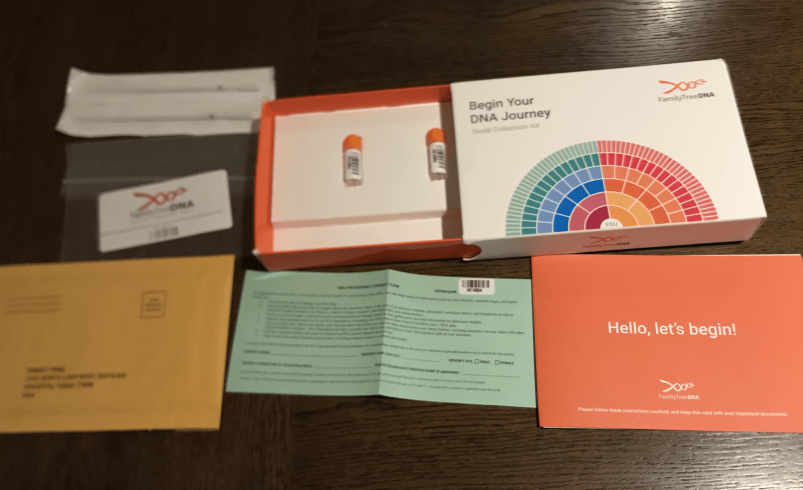
AncestryDNA’s process begins once you receive your kit and register it to your Ancestry account. This step is crucial as it links your sample to your personal account, ensuring that your results can be processed and returned to you. The sample collection kit comes with clear instructions for providing your saliva sample, which you then mail back to AncestryDNA for analysis.
Generally, AncestryDNA aims to process your DNA within 6 to 8 weeks from the time they receive your sample. However, this timeframe can vary, especially during high-volume periods such as after the holidays. AncestryDNA emphasizes that this estimate is just that—an estimate—and actual processing times can vary.
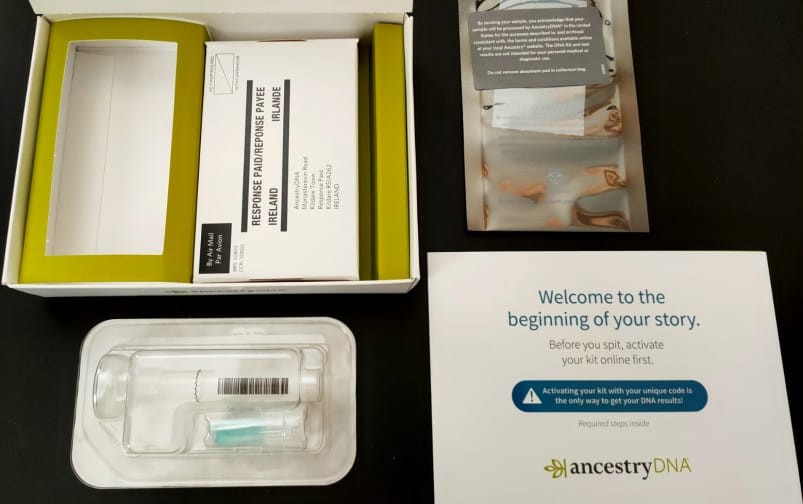
How to Get a DNA Test With FamilyTreeDNA and AncestryDNA
Getting a DNA test from FamilyTreeDNA or AncestryDNA is a straightforward process that can provide you with insights into your ancestry, ethnicity, and potential relatives. Here’s a simplified guide to help you through the steps for both companies.
- Order Your Kit. Visit the website of either AncestryDNA or FamilyTreeDNA (depending on which one you choose), pick the test that best suits your needs. For example, on FTDNA’s site you can choose between Family Finder for autosomal DNA, Y-DNA for paternal lineage, mtDNA for maternal lineage and more. On Ancestry, you can choose between AncestryDNA tests (with different subscription options or without) or their Pet DNA test. Then, complete your purchase.
- Register Your Kit. Once you receive your kit, it’s crucial to register it on the company’s website using the unique code provided. This links your sample to your account, ensuring that your results can be correctly processed and accessed.
- Collect Your DNA Sample. Both companies use a simple saliva collection method. Before taking the test, avoid eating, drinking, smoking, or chewing gum for 30 minutes to ensure the purity of your sample. The kit will include a collection tube or swab and detailed instructions on how to collect your sample properly.
- Send Your Sample. After collecting your sample, seal it in the provided packaging. Both companies typically include prepaid shipping materials, allowing you to return your sample by mail at no additional cost.
- Wait for Results. See text above to get more information on processing timeframes.
Both companies are generally willing to send a free replacement kit if there’s an issue with your sample or if it gets lost or damaged. Prepaid return shipping is usually provided, but shipping policies can vary, so check the specifics at the time of your order.
Test Results
The DNA test results from FamilyTreeDNA and AncestryDNA have some similarities and differences in the type of information provided, the presentation of your data, and the tools available for further exploration of your genetic heritage. Here’s an overview of what to expect from the test results of each service.
FamilyTreeDNA Results
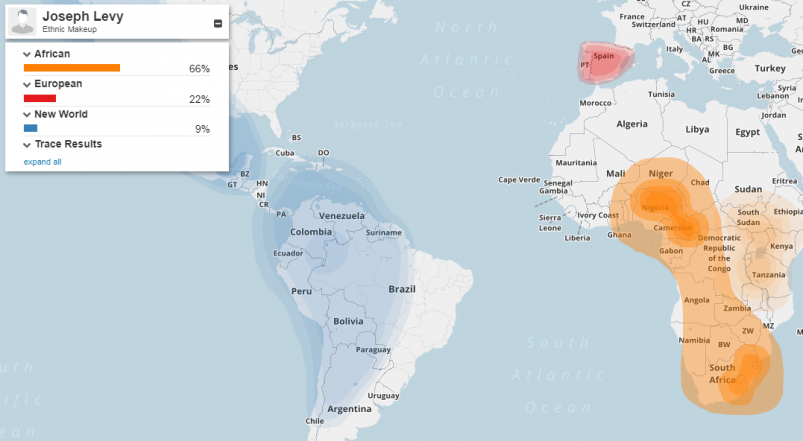
FamilyTreeDNA offers detailed reports on your ethnic and geographical background through their Family Finder test, which includes a breakdown of your ancestral origins. You’ll also get access to Chromosome Browser, a standout feature allowing you to visually compare your chromosomes with up to 7 other DNA matches to identify shared segments. This tool is particularly powerful for genetic genealogy and is not directly matched by AncestryDNA.
There’s also the Matrix tool which enables you to select up to 10 matches and view a grid that shows which matches share DNA with others. It functions like a clustering tool on a more manageable scale, aiding in understanding relationships between matches. FamilyTreeDNA also lists genetic relatives in the database, with the option to contact them for family history exploration.
If you opt for Y-DNA (paternal lineage) or mtDNA (maternal lineage) tests, you’ll receive information about your haplogroups, tracing your direct paternal or maternal ancestors’ migration paths and origins.
You’ll also get access to various tools provided to analyze your DNA in conjunction with traditional genealogical research, such as linking your results to a family tree.
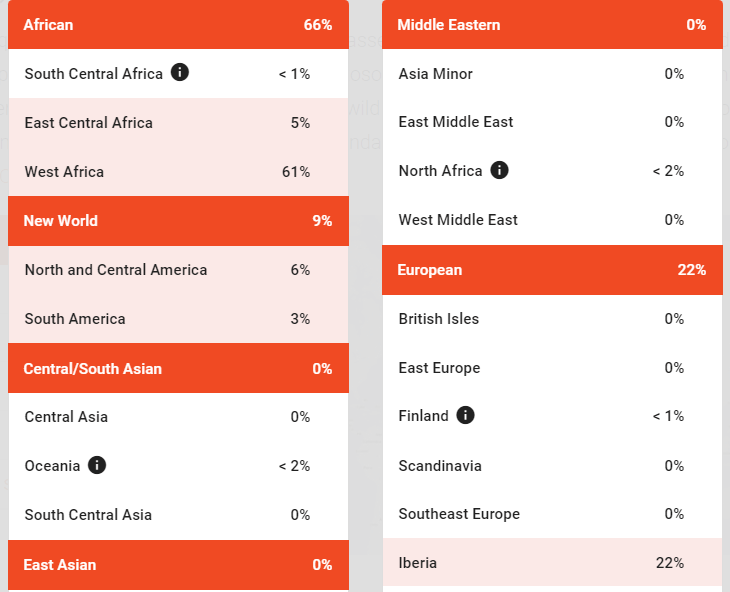
FamilyTreeDNA offers cousin matching with a notable feature regarding its centimorgan (cM) threshold for matches. Unlike some other services where a higher cM value is required for a match to appear, FamilyTreeDNA sets this threshold at just 1cM. This lower threshold means that FamilyTreeDNA may show you as sharing more DNA with a match compared to other platforms, which could result in a larger number of matches being identified.
It’s crucial to note that appearing as a match with more individuals on FamilyTreeDNA doesn’t automatically imply a higher DNA share with those matches in actuality; it primarily signifies FamilyTreeDNA’s broader criteria for pinpointing potential relatives. This strategy is especially beneficial for individuals aiming to broaden their search in genealogical studies, as it enables connections with more distant relatives. By contrast, AncestryDNA requires sharing a minimum of 8 centiMorgans (cM) to be considered a match with someone.
In addition, you can get a wellness test in combination with FTDNA’s FamilyFinder DNA test and get more information on your health, traits, proper exercise needs, food allergies, and more. It can give you 30+ reports on your weight management, heart health, caffeine, sleep, and vitamin needs, as well as your bone health.
AncestryDNA Results
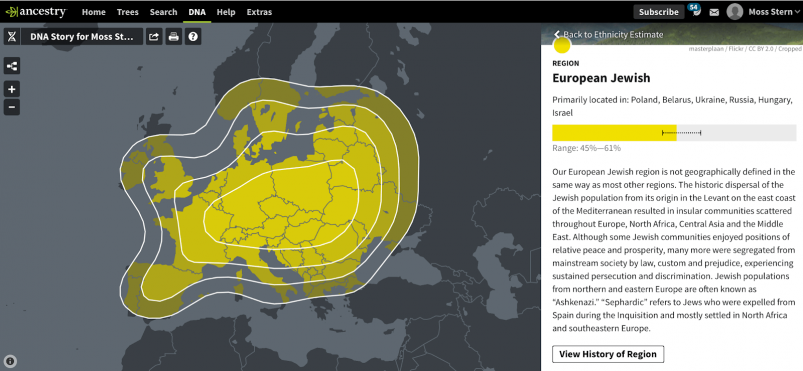
It also offers ThruLines, an advanced feature that suggests how you may be related to your DNA matches through a common ancestor, helping to trace lineage and build your family tree. Ancestry will give you historical insights into the migration paths your ancestors might have taken, along with historical details about those regions.
As a bonus, if you have an Ancestry subscription, you can easily integrate your DNA results with their vast collection of historical records, further aiding in family history research.
Unfortunately, AncestryDNA won’t give you any health information, and it doesn’t have too many tools to explore your DNA. However, it’s still extremely useful thanks to its low pricing and huge database which can easily connect you with relatives and give you accurate ethnicity breakdowns.
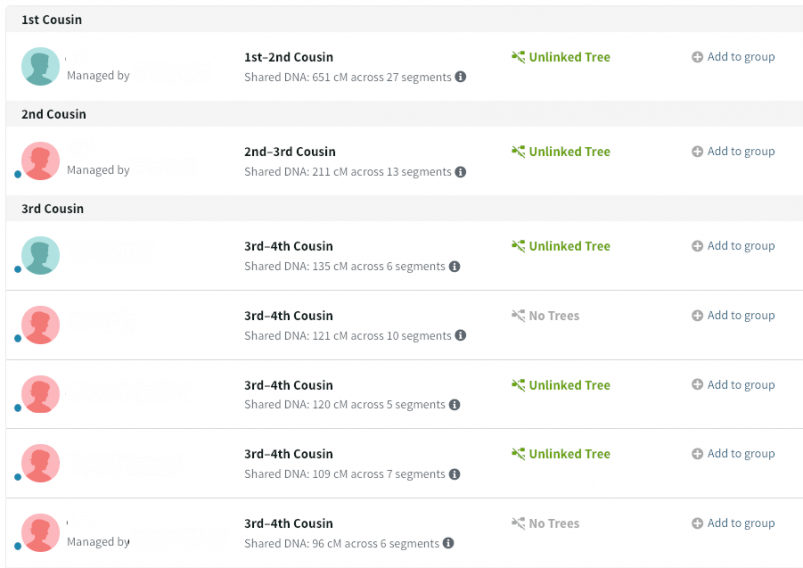
How Accurate are the DNA Test Kits?
DNA test kits from reputable companies like FamilyTreeDNA, AncestryDNA, and others are generally considered highly accurate for the purposes of ancestry and relative matching. These tests analyze hundreds of thousands to millions of points in your DNA, known as SNPs (single nucleotide polymorphisms), to determine your genetic makeup, ethnic background, and potential relatives. Here’s a closer look at the accuracy of these tests:
Genetic Markers and Ethnicity Estimates
The accuracy of DNA test kits largely depends on the number of genetic markers tested and the reference populations used to interpret results. For ethnicity estimates, companies compare your DNA to samples from their reference databases, which are compiled from individuals with long histories in specific regions. The size and diversity of these databases significantly influence the accuracy of ethnicity estimates. As these databases grow and become more diverse, the accuracy of these estimates improves.
Relative Matching
For relative matching, DNA test kits are highly accurate at determining close familial relationships such as parents, siblings, and first cousins. The further out the relationship (second cousins, third cousins, and beyond), the more difficult it becomes to accurately predict the exact relationship due to the smaller amounts of shared DNA. However, the identification of these individuals as related to you in some way is typically accurate.
Considerations
- Centimorgans (cM): The amount of shared DNA, measured in centimorgans, helps predict the likelihood of a relationship. Lower thresholds can identify more distant relations, though with a higher chance of false positives.
- Database Size: The larger the DNA database of the testing company, the higher the likelihood of finding matches. This is because there are more people to compare your DNA against.
- Ethnicity Admixture: Ethnicity estimates can vary between companies due to different reference populations and algorithms. These estimates become more refined with advancements in science and as databases expand.
Database Size and Geographical Coverage
FamilyTreeDNA’s database size is about 1.7 million autosomal DNA tests, offering a wide range of potential connections for users interested in exploring their ancestry. In comparison, AncestryDNA boasts the largest database in the consumer DNA testing industry, with over 28 million DNA tests.
This vast difference means that users of AncestryDNA might find a larger number of potential relative matches due to its broader database. Each service has its unique strengths, with FamilyTreeDNA providing detailed Y-DNA and mtDNA tests, enhancing the genealogical experience for users looking into specific lineage details.
When it comes to geographical coverage, Ancestry covers 1,800+ geographical regions across the globe, while FTDNA covers 90 reference populations. In terms of historical records, Ancestry also tops FamilyTreeDNA since it has 20 billion + historical records while FTDNA has only 2 billion (still a lot, but also a lot less than Ancestry).
Privacy Measures
FamilyTreeDNA and AncestryDNA both prioritize user privacy and have implemented several measures to ensure the safety and confidentiality of personal and genetic information. They use data encryption to protect information both when it’s stored and during transmission. Both companies allow users to control how their data is shared, providing options to opt out of certain features like matching with relatives or contributing to research.
They are transparent about their use of data, with detailed privacy policies explaining user rights, including accessing, downloading, or deleting their data. Additionally, these companies comply with international privacy regulations, such as GDPR, and have policies in place regarding law enforcement requests, typically requiring a court order before releasing any user information. This focus on privacy ensures that users have significant control over their genetic data and its use.
Raw data download and upload
FamilyTreeDNA allows for the free upload of raw DNA data from other services, providing a chance to utilize their tools and databases without needing to purchase another kit. This service accepts data in various formats from companies like AncestryDNA, 23andMe, and MyHeritage, among others. AncestryDNA, on the other hand, does not offer a similar option for free raw DNA data uploads from other services, focusing instead on users who take their own DNA test through their service.
Community and Additional Features
AncestryDNA provides a feature that allows users to discover and connect with relatives through DNA Matches. This is a core component of their community offering, enabling users to find others who share significant genetic similarities. The service offers predictive relationships, estimating how closely you might be related to your matches (e.g., second cousins, third cousins) and facilitates communication through a secure messaging system.
Additionally, Ancestry groups these DNA matches into “Circles,” now part of their ThruLines feature, which helps users see how they might be related to their matches through a common ancestor, encouraging collaboration and connection among distant relatives.
FamilyTreeDNA emphasizes community connections through its unique project groups. These groups are formed around common ancestors, surnames, geographical regions, or direct paternal (Y-DNA) and maternal (mtDNA) lineages. Members can join projects that resonate with their genetic makeup or ancestral interests, facilitating connections with others who share similar DNA characteristics or research goals.
FamilyTreeDNA’s Chromosome Browser also aids in community building by allowing users to compare their DNA segments directly with those of their matches, enabling a deeper understanding of shared genetic heritage and fostering connections based on precise genetic similarities.
Both platforms offer tools designed to enhance user interaction and collaboration based on shared genetics. Ancestry and FamilyTreeDNA have built-in messaging systems that allow users to communicate privately, share insights, and collaborate on family history research. These platforms provide recommendations for potential relatives, helping users expand their family trees and uncover shared ancestry. Moreover, both companies have privacy settings that give users control over how much information they share with potential relatives and other community members.
In essence, Ancestry’s community features are centered around leveraging its extensive user base and integrating DNA matches with historical records for a comprehensive genealogical discovery experience. In contrast, FamilyTreeDNA focuses on facilitating deep genetic connections and collaborative research through specialized groups and advanced DNA comparison tools, appealing to those with specific genealogical or genetic interests.
Customer Support
Ancestry offers a comprehensive customer support system designed to assist users with a range of queries, from technical issues with the website to understanding DNA results.
Support is accessible through multiple channels including phone support, email, and live chat, ensuring users can choose the method that best suits their preferences. Ancestry also provides a detailed FAQ section and a help center on their website, where users can find answers to common questions and tutorials on how to use various features of the service. The company is known for its responsive customer service team, which is well-regarded for helping users navigate their genealogical journey.
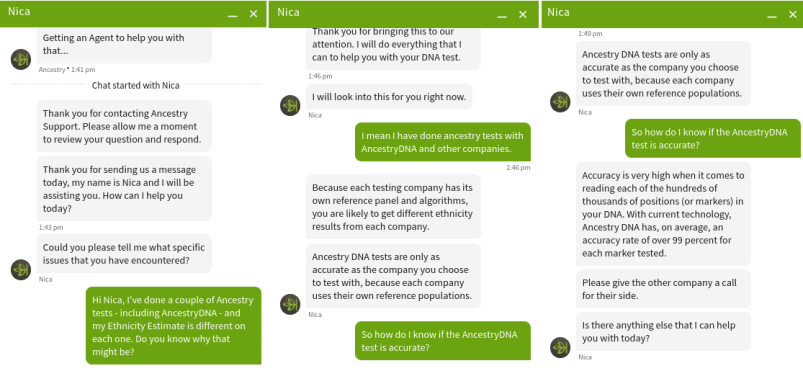
FamilyTreeDNA also offers a robust support system for its users, featuring email support, phone support, and a comprehensive FAQ section on their website. The company prides itself on providing specialized assistance for more technical aspects of DNA testing, such as understanding Y-DNA and mtDNA haplogroups or using advanced features like the Chromosome Browser.
FamilyTreeDNA’s support team is equipped to help both novice users and seasoned genealogists. While FamilyTreeDNA may not offer live chat, the depth of knowledge and the personalized support provided through email and phone communications are highly valued by its user community.
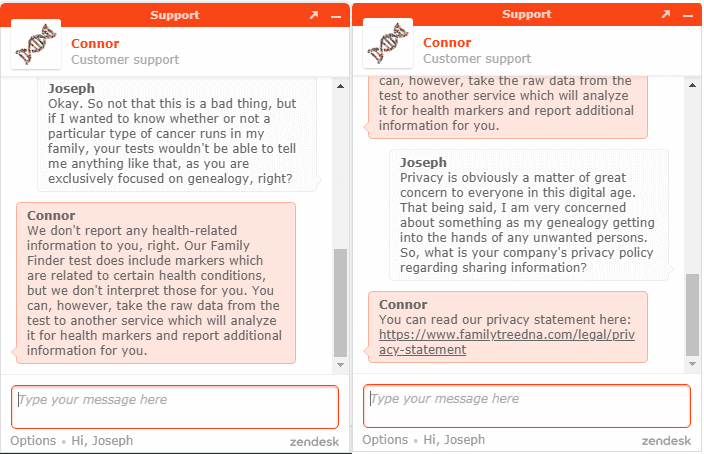
Pricing
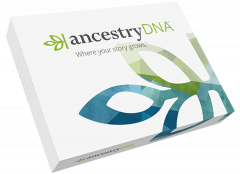
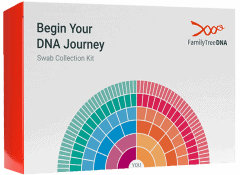
Ancestry offers its AncestryDNA test, which provides ethnicity estimates and potential family connections, at a base price that often hovers around $99, although promotions and discounts are frequently available.
Beyond the DNA test, Ancestry encourages users to subscribe to its various membership plans for access to historical records and more advanced genealogical tools. These subscription plans vary in price, starting from around $24.99 per month for a U.S. Discovery membership, which gives access to U.S. records, to up to $49.99 per month for the All Access membership, which includes international records and access to Newspaper.com Basic and Fold3.com. These subscriptions are offered in monthly or six-monthly payment options, with the latter offering a cost-saving compared to the monthly rate.
FamilyTreeDNA’s pricing structure is a bit more complex, given its range of specific DNA tests. The Family Finder test, which is equivalent to the AncestryDNA test in terms of finding relatives and providing ethnicity estimates, starts at around $79. For those interested in exploring direct maternal or paternal lines, mtDNA and Y-DNA tests are offered, starting at approximately $119 and $159, respectively. FamilyTreeDNA also provides advanced tests for deep ancestry analysis, such as the Big Y-700, which can cost upwards of $449. Unlike Ancestry, FamilyTreeDNA does not require a subscription to access basic features and connect with matches, but advanced tools and detailed analyses may come with additional costs.
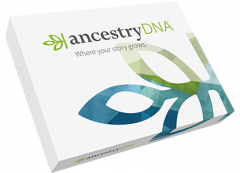

Bottom Line
Choosing between FamilyTreeDNA and AncestryDNA depends on what you’re looking for in a DNA testing service.
FamilyTreeDNA offers unique tools like the Chromosome Browser and accepts free raw DNA data uploads from other services, making it a flexible option for those with existing test results.
AncestryDNA, boasting the largest database, does not allow for free uploads but offers extensive historical records integration for comprehensive ancestry exploration. Ultimately, your decision should align with your genealogical goals, whether that’s deep diving into specific lineage details or exploring a broad ethnic heritage.
FAQs
What are the main differences between FamilyTreeDNA and AncestryDNA?
The main differences lie in their specialized services and database sizes. FamilyTreeDNA offers detailed Y-DNA and mtDNA tests, which are ideal for tracing direct paternal and maternal lines. AncestryDNA, however, has the largest user database, making it superior for finding relatives and exploring a wide range of ethnic backgrounds. AncestryDNA also provides access to a vast collection of historical records, enhancing genealogical research.
Can FamilyTreeDNA and AncestryDNA help me find relatives?
Yes, both services can help you find relatives, but AncestryDNA has a larger database, potentially increasing your chances of connecting with distant family members. FamilyTreeDNA also facilitates relative connections, especially with its Y-DNA and mtDNA tests for those interested in specific paternal or maternal lineages.
Which service is better for detailed ethnic breakdowns?
AncestryDNA is generally considered better for detailed ethnic breakdowns due to its extensive research into global genetic populations and its broad ethnic categories. It offers insights into a wider variety of regions compared to FamilyTreeDNA.
How do FamilyTreeDNA and AncestryDNA handle privacy and data security?
Both companies prioritize user privacy and data security, offering various levels of consent for DNA data use and sharing. Users can choose to opt-in or opt-out of research initiatives and relative matching services. It’s essential to review each company’s privacy policy to understand how your data will be used and protected.
Which service offers the best value for the cost?
The best value depends on your specific needs and interests in DNA testing. FamilyTreeDNA might offer better value for those specifically interested in deep ancestral lineage testing through Y-DNA and mtDNA tests. AncestryDNA could represent a better value for individuals looking for a comprehensive exploration of their family history and ethnic background, given its larger database and extensive genealogical resources. Prices and features should be compared directly, as they can change.

